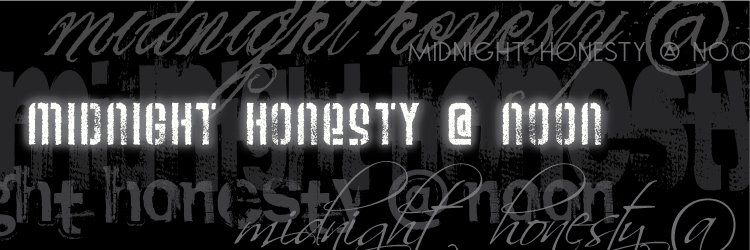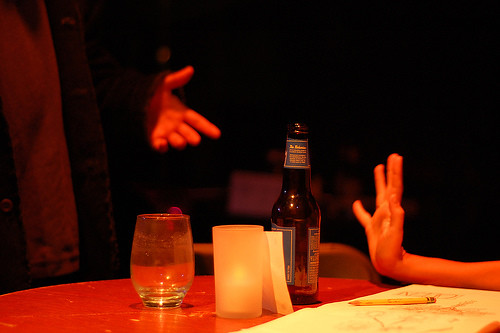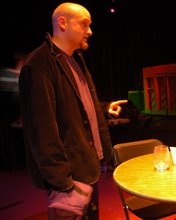The Gap in the Gap
On another note, I'd be interested in reading your "What's Wrong With Theater" post. If there's something that we're all whining about but not changing, I'd definitely want to know what that is.
And I'll admit some hostility toward your "War on the audience" concept, even though you haven't articulated it yet - hostility connected to baggage. I've just been through a binge of seeing theater because of the Fringe Fest here in NYC. I saw a lot of different styles and genres of shows, rendered with different degrees of skill, but all presented with joy of performance and a desire to connect. I couldn't detect a shred of hostility toward the audience.
Maybe that's not what you mean by the term. I'm just saying that as a fairly regular theatergoer, if there really is a rampant breed of plays getting produced at any level that are designed to attack the audience, I still haven't seen one. I see this type of theater referred to by bloggers from time to time, and I'd like someone to properly explain to me what it is.- Mac Rogers
This is actually part of the reason I wasn't going to go into it. In the stereotyping discussion I mentioned that we shouldn't care about the plays exhibiting the worst of these stereotypes, because it generally meant they weren't good, so it is true of most of the things that are "wrong" in theatre. The folks who care enough to be doing something about it aren't generally the one's who are perpetrating the harm.
By the War On the Audience I mean Deadly Theatre. Specifically, theatre created without that joy of performance and desire to connect that Mac mentions. Theatre that is so rooted in concept and conceit that it is only accessible to other members of the club. This sort of production is honestly most often the domain of the evangelical university student and the recently graduated.
I don't think that it is an active hostility, to my thinking it's the passive aggression of "fuck'em if they don't get it".
I strongly believe that in pursuing this particular art form you cannot ignore the experience of the audience no matter how high your concept. By all means challenge them (and no, they don't have to like it), but allow them in on some level, it's not their fault they didn't choose to also pursue this art form, don't punish them for it.
As Mr. Rogers and Mr. Walters both expressed interest in a "What is wrong with theatre" post, I went back to work on it. It was 1300 words without being fleshed out before I abandoned it as a flawed concept.
Everything that is "wrong with theatre" is wrong with theatre as I intend to do it in Austin in 2007 with my level of funding. It's not relevant to a playwright in NY, or a professor in NC. Those are things for me to work out on my own as applies to my own practice.
There are of course the universal 'wrongs' of lack capital and space, but we all know what those are, and all I was going to say about that was "quit whining", which no one wants to hear.
But let me ask this, because my fiancee asked me:
What good does that discussion do?
Aside from the "all theatre problems are local problems" truism, what benefit is there to being an echo chamber for whining? It's just adding negativity to negativity about hypothetical hypotheticals.
Look at the defensiveness and hostility in this community when anyone tries to criticize anything. Look at the response to George Hunka and 100 Saints, or Isaac and dramaturgy. The theatrosphere isn't interested in honest discussion of this stuff, they are interested in tuning their war drums and having at it with people they've (largely) never met.
For myself, I think that we need to focus on what we love about this art, what we want to do with it, what we want to do next, and how we can improve our methods on that path.
See: Hal Brooks
If you are in Austin and want to talk about what I think needs doing here in my own theatrical house, and how we can go about getting that done? Drop me an email... we'll get coffee.
Also? In RE: Walking out of a show...
I never have. But unless you have a position on the show or some other obligation to the production I have no problem with it, even my own. [though for my part I'd prefer you stayed for the whole thing and gave me notes over a beverage afterward]. I can't do it. I'm not advanced enough a theatre artist to be able to pass up a chance to see someone else's take on anything. I can't improve my craft if I'm not learning and I learn at a much lower rate on my couch at home than sitting in an audience being engaged, however deeply engaged that is.
Homework!
- What project of your own are you most looking forward to in the next six months?
- What is the worst thing you've ever sat all the way through (feel free not to use names)
- What did you learn from it? What was your takeaway?








